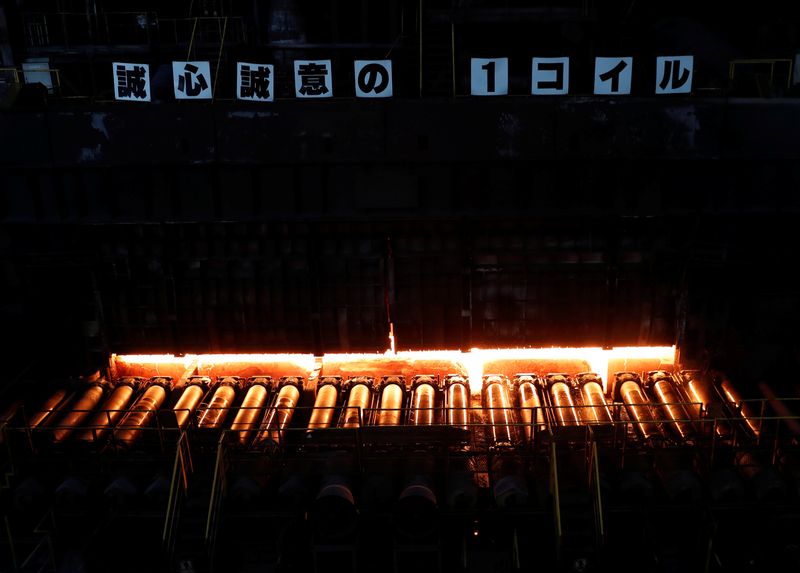By Alexandra Alper
WASHINGTON (Reuters) – Nippon Steel claims the White House has had “impermissible undue influence” over a national security review of its $14.9 billion bid for U.S. Steel and has threatened legal action if the deal is blocked.
The accusation was made in a December 17 letter signed by counsel for Nippon Steel and US Steel and seen by Reuters to the Committee on Foreign Investment in the United States (CFIUS).
CFIUS, which reviews foreign acquisitions for national security risks, faces a Monday deadline to approve the deal, expand its review or recommend that President Joe Biden scuttle it. An expected government shutdown, however, would stop the clock, CFIUS attorneys said.
Over the weekend, CFIUS cleared the way for Biden, who has long opposed the partnership, to block it in a 29-page letter by raising alleged unresolved national security risks, Reuters exclusively reported.
In their response, Nippon Steel and US Steel refute CFIUS’ national security arguments, claiming that Biden improperly influenced the outcome of the review before CFIUS could reach its conclusions.
In particular, their December 17 letter alleges that Biden may have influenced the deal to please United Steelworkers (USW) President David McCall, who opposes the partnership and supported Biden as president shortly after he announced his opposition to the merger.
Biden has opposed the deal because he believes US Steel should be American owned and operated.
“We are deeply concerned that the December 14 letter reflects the White House’s impermissible influence in the CFIUS process at the behest of third parties opposing the transaction and seeking to weaken the parties, namely Cleveland-Cliffs (NYSE: ). ., led by CEO Lourenco Goncalves, and Mr. McCall,” reads the latest response from Nippon and US Steel to CFIUS.
Cleveland-Cliffs was a lover of US Steel and also opposes the Nippon deal.
White House spokesperson Saloni Sharma said the allegation “is not true.” She did not specifically address whether Biden would block the deal, adding: “The president has made it clear that he will continue to see what comes out of the CFIUS process.”
“We look forward to completing the transaction and remain committed to working with all relevant parties,” US Steel said in a statement.
Nippon steel and Cleveland Cliffs CEO Lourenco Goncalves declined to comment.
OPPOSITION AT A HIGH LEVEL
The proposed partnership has faced high-level opposition within the United States since it was announced a year ago, with both Biden and his new successor Donald Trump targeting it as they tried to win over union voters in the swing state of Pennsylvania. where US Steel is headquartered. Trump has also claimed that the iconic American company should remain American property.
The merger appeared to be quickly blocked after the companies received a letter from CFIUS on August 31, seen by Reuters, arguing the deal could hurt supplies of steel needed for crucial transportation, construction and agricultural projects.
But Nippon Steel countered that its investments, made by a company from an allied country, would in fact support US Steel’s production and won a 90-day extension of the review. That extension gave CFIUS until after the November election to make a decision, raising hopes among supporters that a calmer political climate could favor the deal’s approval.
“PERSONAL INSURANCE”
Demonstrating that President Biden was doing McCall a favor, the letter quoted a USW news report from February in which the union leader stated: “Today we received personal assurance that President Joe Biden has our backs,” McCall said. “He has always been a friend of the American worker and our union, and we are grateful that he is taking an interest in this cause.”

The White House denied the claim that Biden’s opposition is at McCall’s behest and referred Reuters to his March statement against the deal. McCall said in a statement that “Nippon’s attempts to spread unsubstantiated rumors and threats of legal action are deplorable, but ultimately nothing more than a distraction from the dangers posed by the US Steel acquisition.”
If Biden blocks the deal, “the parties would immediately file a petition with the U.S. Court of Appeals for the DC Circuit challenging the decision as a violation of due process and the presidential authority,” Nippon Steel wrote under the authorities of CFIUS.


